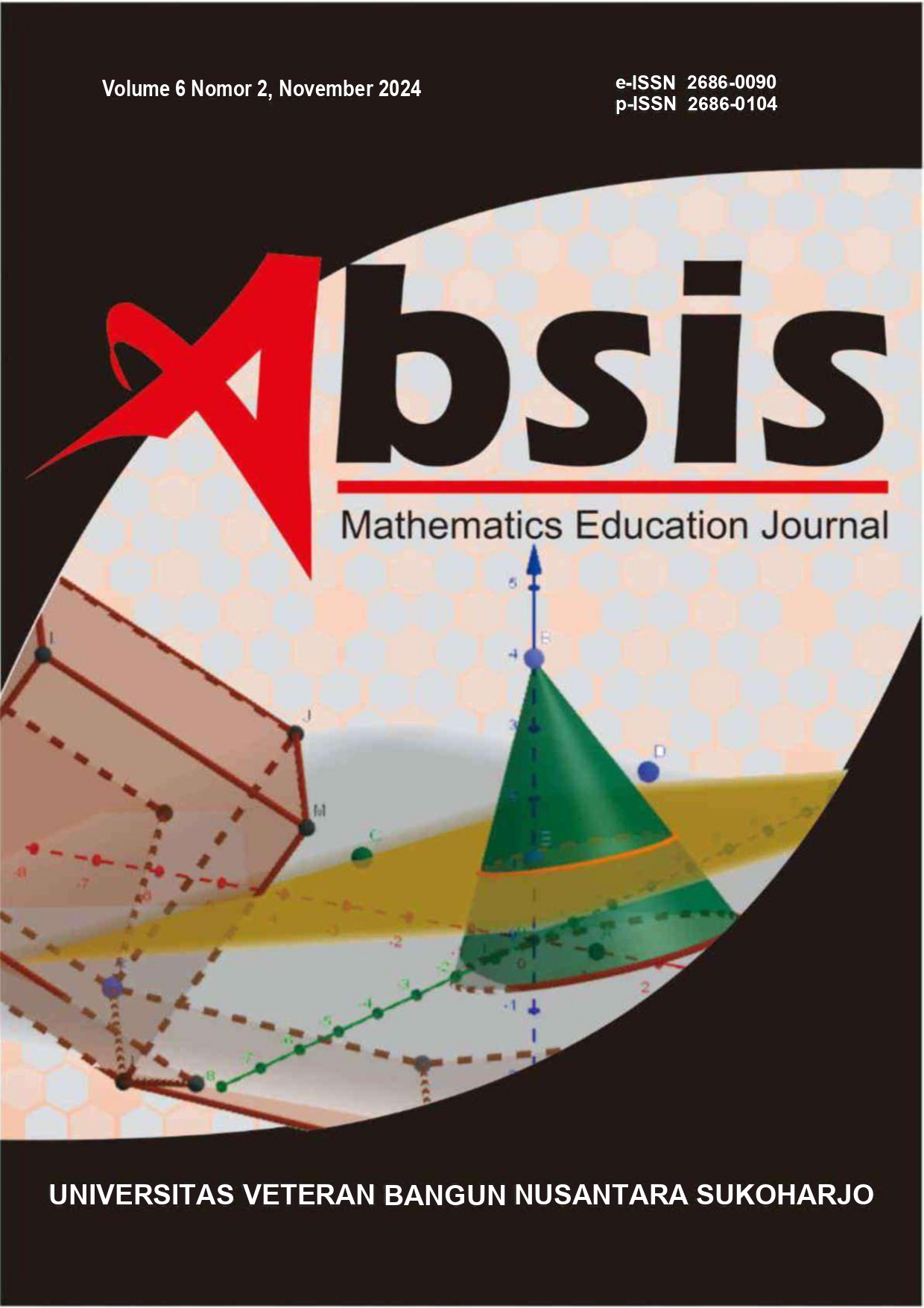Analisis Kemampuan Pemahaman Matematis Mahasiswa dalam Menyelesaikan Soal Integral Tentu Berdasarkan Teori APOS
DOI:
https://doi.org/10.32585/absis.v6i2.5882Abstract
This study aims to describe the mathematical understanding ability of students regarding the concept of definite integral based on APOS Theory, and describe the achievement of each indikator of students' mathematical understanding ability regarding the concept of definite integral of algebraic functions based on APOS Theory. The research method used is descriptive qualitative. The data collection techniques used in this study were written tests and interviews. The results showed that the achievement in question number one on the K indikator 88.89%, L 83.33% and S 69.44%, most of the students who were able to solve the problem meant that they had been able to organise the actions, processes, and objects they had so that based on APOS theory, the student was at the level of understanding the scheme. Achievement in question number two on indikator K 80.55%, L 58.33% and S 50%. Most students are only able to identify properties and conditions, meaning that students only have the ability to understand at the action stage. Achievement in question number two on indikator K 86.11%, L 66.67% and S 63.88%. Most students are only able to identify properties and conditions and work on problems according to the steps.
Downloads
References
Arnawa, I Made. 2009. “Mengembangkan Kemampuan Mahasiswa Dalam Memvalidasi Bukti Pada Aljabar Abstrak Melalui Pembelajaran Berdasarkan Teori APOS.” Jurnal Matematika Dan Sains 14 (2): 62–68
Fatimah, Fatimah, Yolinika Tampani, and Muh Izabi Alis Pindi. 2021. “Peningkatan Hasil Belajar Matematika Melalui Teori Apos Pada Siswa Kelas VIIC MTs Husnul Khatimah.” Pepatudzu: Media Pendidikan Dan Sosial Kemasyarakatan 17 (1): 19. https://doi.org/10.35329/fkip.v17i1.1945
Fitria, Mia. 2022. “Kemampuan Pemahaman Konsep Mahasiswa Dalam Penyelesaian Soal Integral Berdasarkan Teori Apos.” Dharmas Education Journal (DE_Journal) 1 (1): 48–54. https://doi.org/10.56667/dejournal.v1i1.59
Giriansyah, Fajri Elang, Heni Pujiastuti, and Ihsanudin Ihsanudin. 2023. “Kemampuan Pemahaman Matematis Siswa Berdasarkan Teori Skemp Ditinjau Dari Gaya Belajar.” Jurnal Cendekia: Jurnal Pendidikan Matematika 7 (1): 751–65. https://doi.org/10.31004/cendekia.v7i1.1515
Handayani, I, and W Noviana. 2020. “Pengaruh Model Apos Berbasis Ict Dan Model M-Apos Terhadap Kemampuan Pemahaman Matematis Mahasiswa.” Proceedings … 5: 31–36. http://openjournal.unpam.ac.id/index.php/Proceedings/article/view/5252%0Ahttp://openjournal.unpam.ac.id/index.php/Proceedings/article/download/5252/3730
Handayani, Ita, Widyah Noviana, Jurnal Pendidikan Glasser, Sistem Persamaan Linear, and A Pendahuluan. 2022. “Soal Aljabar Linear Dan Matriks,” 63–69
Imswatama, Aritsya, and Nur’aini Muhassanah. 2016. “Analisis Kesalahan Mahasiswa Dalam Menyelesaikan Soal Geometri Analitik Bidang Materi Garis Dan Lingkaran.” Suska Journal of Mathematics Education 2 (1): 1. https://doi.org/10.24014/sjme.v2i1.1368.
Ismah, Ismah Afifah Sarah. 2016. “Melalui Media Interaktif Mischief Dan Konvensional.” Jurnal Teknodik 665: 144–54.
Jana, Padrul. 2018. “Analisis Kesalahan Mahasiswa Dalam Menyelesaikan Soal Matematika Pada Pokok Bahasan Vektor.” Jurnal Mercumatika: Jurnal Penelitian Matematika Dan Pendidikan Matematika 2 (2): 8–14. https://doi.org/10.26486/jm.v2i2.398.
Khaeril Muttaqin, Andi, Yusriman Yahya, and Irmayanti. 2023. “Pemanfaatan Aplikasi Mathway Dalam Menyelesaikan Soal Kalkulus Pada Mahasiswa Tadris Matematika.” Prosiding Seminar Nasional Fakultas Tarbiyah Dan Ilmu Keguruan IAIM Sinjai 2: 63–70. https://doi.org/10.47435/sentikjar.v2i0.1829.
Meoleong, Lexy. 2012. Metodologi Penelitian Kualitatif. Bandung: Remaja Rosdakarya.
Parma, Parma, and Lalu Saparwadi. 2015. “Pengembangan Model Pembelajaran Kalkulus Berbantuan Komputer Melalui Program Maple Di Program Studi Pendidikan Matematika.” Jurnal Elemen 1 (1): 37–48. https://doi.org/10.29408/jel.v1i1.80.
Rismawati, Melinda, and Anita Sri Rejeki Hutagaol. 2018. “Analisis Kemampuan Pemahaman Konsep Matematika Mahasiswa PGSD STKIP Persada Khatulistiwa Sintang.” Jurnal Pendidikan Dasar PerKhasa 4 (1): 91–105.
Rosmaiyadi. 2018. “Analisis Kesalahan Penyelesaian Soal Aljabar Pada Mahasiswa Program Studi Pendidikan Matematika STKIP Singkawang.” Jurnal Pendidikan Matematika 12 (1): 59–70.
Sugiyono. 2005. Memahami Penelitian Kualitatif. Bandung: Alfabeta.
Takaendengan, Bertu Rianto, Asriadi Asriadi, and Wilson Takaendengan. 2022. “Analisis Kesulitan Belajar Mahasiswa Pada Mata Kuliah Kalkulus Lanjut.” Sepren 3 (2): 67–75. https://doi.org/10.36655/sepren.v3i2.690.
Utari, Rahma Siska, and Arini Utami. 2020. “Kemampuan Pemahaman Konsep Dalam Mengidentifikasi Penyelesaian Soal Integral Tak Tentu Dan Tentu.” JPM: Jurnal Pendidikan Matematika 14 (1): 39–50. https://doi.org/https://doi.org/10.22342/jpm.14.1.6820.39-50
Downloads
Published
How to Cite
Issue
Section
License
Copyright (c) 2024 Ita Handayani, Widyah Noviana

This work is licensed under a Creative Commons Attribution-ShareAlike 4.0 International License.
Authors who publish with the Absis: Mathematics Education Journal agree to the following terms:
- Authors retain copyright and grant the journal the right of first publication with the work simultaneously licensed under a Creative Commons Attribution License (CC BY-SA 4.0) that allows others to share the work with an acknowledgment of the work's authorship and initial publication in this journal.
- Authors are able to enter into separate, additional contractual arrangements for the non-exclusive distribution of the journal's published version of the work (e.g., post it to an institutional repository or publish it in a book), with an acknowledgment of its initial publication in this journal.
- Authors are permitted and encouraged to post their work online (e.g., in institutional repositories or on their website) prior to and during the submission process, as it can lead to productive exchanges, as well as earlier and greater citation of published work.







